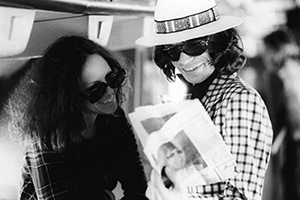Lisa Robinson in conversation with Fran Lebowitz, 92Y, NYC, 5.8.14
by Michael Sherer
Posted: May 2014
(3189) Page Views

Lisa Robinson with Mick Jagger, '70's
Lisa Robinson and her close friend of 41 years, Fran Lebowitz, had quite an engaging and humorous chin wag, as the British say. Robinson’s new autobiography, “There Goes Gravity,” was the catalyst for their sit down at the fabled 92Y on the Upper East Side of NYC.
Robinson has been a music journalist since 1969. She’s written for several magazines, the long defunct and Michigan based Creem being the most interesting in my view, and has been with Vanity Fair since ’99. The ‘70’s and ‘80’s saw very few women holding down this role, as the music world has been, and still is for the most part, run by men. Interviewing musicians, singers and entertainers has been Robinson’s specialty, and she’s done countless numbers of them.
Fran Lebowitz, a writer also, began being read by the public when she was hired by Andy Warhol to contribute a column to his Interview paper in the early ‘70’s. She became popular very quickly, due to her acerbic, dry wit and keen observations. A stint at Mademoiselle magazine followed.
These two women, both Jewish, no-bull types were very comfortable with each other, and this allowed for open and candid dialog. It began with Lebowitz saying to the intimate audience “Hello everybody.” Robinson replied with “Hi.” Lebowitz then quipped “I wasn’t talking to you.” Laughs were all around in the first 30 seconds, setting the tone.
Lebowitz explained that most of the questions on her pages of notes came from Robinson herself. Some interesting ones were the following:
It was Robinson that introduced David Bowie to Lou Reed and Iggy Pop at a restaurant in Manhattan around ‘72. Bowie would go on to produce Reed’s break though record, “Transformer,” in ’73.
Madonna was the most boring interview Robinson has done, as she didn’t reveal much and was too full of herself. Robinson also stated that she feels that Madonna is overrated and not particularly talented.
Keith Richards was among the most interesting by far, as he was very open, honest, and humorous. It was when he was sober in the late ‘70’s, having just quit using heroin.
Robinson said she very much regrets that when Frank Sinatra’s handler asked for her questions to be provided ahead of an interview with him, Robinson declined to provide them and therefore lost the opportunity. She realized in hindsight that she was too much on a high horse.
Robinson noted that she’s been on a few Led Zeppelin tours, and felt they exemplified the high flying, hedonistic, rock and roll lifestyle more than any of their contemporaries. They had their own jet, called The Starship, women were throwing themselves at them, they were making the most money of any band in the world for their concerts, getting an unheard of 90/10 split in their favor, thanks to their manager, Peter Grant. Drugs and alcohol were flowing. Robinson equated it all to them living “in a candy store.”
It’s well-known that the very liberal access allowed for journalists, photographers, etc., in the ‘70’s was far greater than what it became thereafter. The ‘70’s was the first time that stadiums were being used to perform in, with the advent of massive PA systems that could reach vast numbers of audience members. Things were bigger and louder than ever. Some of the looseness of the ‘60’s was still present in terms of not being too corporate and heavily monitored in general, so this environment was a heady mix, indeed. Despite this, Robinson explained that she has always been very down to earth and not at all a star-struck type. Being a native Manhattanite all her life plays a role in that. Robinson said that as an example of her level-headed temperament, the first thing she said to the male chauvinistic Mick Jagger in the ‘70’s was that his shoes were tacky. Jagger in turn was disarmed and respected that she wasn’t treating him specially, as most everyone else did, which allowed for a candid and good rapport between them thereafter.
Robinson also had a rewarding relationship with Michael Jackson. She explained that early in her career, she was dispatched to the home of the Jackson family in Encino, California to interview Michael. Berry Gordy, head of Motown Records, to which they were signed, wanted everyone to think that Michael was 10 but he was actually 12. Robinson discussed how highly precocious Michael was. He knew a lot about music, and had a very hungry mind to know all sorts of things, including Robinson’s then new world of the media. He told Robinson how he would scrutinize the stage moves of James Brown, his idol. He could imitate him flawlessly, and do his own moves as well. In summary, Jackson was immersed in the culture of show business, and Robinson quickly predicted that he would be a major star.
Robinson made it clear that she got into the field because she loves the music, first and foremost. As she told Teen Vogue: “I never took a journalism class, but I started doing [radio host and newspaper columnist] Richard Robinson’s filing for $25 a week. Three months after I met him, he asked me to quit my teaching job and work for him full-time - for a third of what I was making as a sub. My mother told it me I was crazy, but I said, ‘You know what? I love music, I’m going to take this risk, and we’ll see what happens.’ It opened a door to the world of rock ‘n’ roll and allowed everything else to happen.” Forty four years on, a ton has happened for Robinson. Her book should just about cover the gist of it.